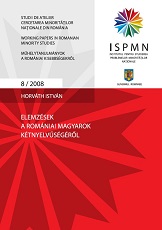Elemzések a romániai magyarok kétnyelvűségéről
Analysis of Bilingualism of Hungarians in Romania
Author(s): István Horváth
Subject(s): Language acquisition, Sociolinguistics, Sociology of Culture, Ethnic Minorities Studies
Published by: ISPMN Institutul pentru Studierea Problemelor Minorităţilor Naţionale
Keywords: Bilingualism of Hungarians in Romania; Mother tongue; normative context of bilingualism; Efficient communications;
Summary/Abstract: Bilingualism is a widespread characteristic of Hungarians from Romania. The study analyses the linguistic context of this community through an empirically grounded description of bilingualism. Building on data provided by the censuses from 1992 and 2002, the article starts with the study of mother tongue as statistical category. In the second part the author discusses three dimensions of bilingualism: bilingual linguistic competence, language use, and the normative context of bilingualism. The typology of bilingualism described in the article reflects the principle of complementarity of the two languages as well as the criteria of success and efficiency in communication. The typology classifies language proficiency, monolingualism and bilingualism according to the relative position of the two languages in the communication repertories.
Series: STUDII DE ATELIER. CERCETAREA MINORITĂŢILOR NAŢIONALE DIN ROMÂNIA
- Page Count: 57
- Publication Year: 2008
- Language: Hungarian
- Content File-PDF

